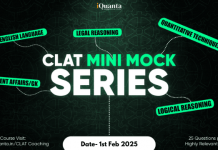iQuanta has launched a Mini Mock Series covering all the sections of the CLAT exam, these questions have been handpicked by our faculty based on the latest CLAT exam pattern.
Instructions:-
1. Attempt all the questions.
2. Once you have completed all the questions of a particular section click on the submit button for scores and explanations then move to the next sections.
3. For each correct answer, you receive 1 mark. For this mock, there is no negative marking.
English Language
Directions: Read the passage and answer the question that follows.
According to a recent Runner’s World survey, 84 percent of women have been harassed while running. That harassment can make you feel unsafe and anxious, both while running and in everyday life.
And that’s not unreasonable: Harassment is scary stuff, and it’s normal to feel a little apprehension about your safety. In fact, fear can be a good thing, since it can tip us off to a dangerous situation, says Adam P. Stern, M.D., assistant professor of psychiatry at Harvard Medical School.
If you feel the hair on the back of your neck stand up as you cruise down a dark pathway, that’s useful. Pay attention to it. But not all fear is productive: If you’re ruled by fear, you might stop lacing up altogether—9 percent of women in our survey say that fear has led them to quit running for a while. Here’s how to tell the difference, and how to not let fear rule your running.
Whether you’re worrying about an event before it happens, or thinking later about all the things that could have gone wrong, you’ve got to remind yourself: Obsessing over stuff that hasn’t actually happened isn’t helpful. Stern suggests dissecting your thoughts with one question: “What role is this mental process serving?” Some degree of worry can actually be helpful, Stern says. Without it, we would never arrive on time to appointments, or learn from our mistakes. But if you’re worrying about things you can’t logistically change (like who you might run into) or ruminating on scenarios that didn’t even happen, realize that these are not productive thoughts.
What are you afraid of? Maybe it’s the idea of getting mugged, or the fact your run starts before the sun is up. You can’t control who else is out, or what time the sun comes up, but you can control where and when you run and how much you can see and hear. Stern says that taking charge of the variables you can control might make you feel safe enough to get out the door. Make small changes to the things you can control—like running at lunch so there’s plenty of daylight—to help you feel like you have a grip on your own safety.
Another way to take control, which doesn’t include making sacrifices in your running routine, is to become an advocate for ending rape culture. Talk to the men in your life. Call out sexism and harassment when you see it, and help women seeking justice. Working to break down this system of oppression is both a worthy endeavour and makes you feel like you’re being proactive, not reactive.
Current Affairs and General Knowledge
Indian Naval Ships visited Singapore from 06 – 09 May 24, aimed at undertaking bilateral engagements and discussing areas of mutual interest and cooperation, and reaffirming the commitment to enhance maritime security and stability in the region. This visit is part of the Operational Deployment of the Indian Navy’s Eastern Fleet to the South China Sea.
The visit provided an opportunity for discussions on enhancing naval cooperation and interoperability between navies of both India and Singapore. A deck reception was hosted onboard INS, wherein personnel from both navies and the Indian diaspora in Singapore and also local diplomatic community had the opportunity to interact, furthering the bonds of friendship and mutual respect.
As part of the Indian Navy’s commitment to maritime education and outreach, local school children were invited to visit the Indian Ships. The children were given guided tours of the ships, where they learned about naval operations, India’s rich maritime history and heritage and also the importance of maritime security.
Legal Reasoning
Directions: The question is based on the reasoning and arguments, or facts and principles set out in the passage. Some of these principles may not be true in the real or legal sense, yet you must conclusively assume that they are true for the purpose. Please answer the question on the basis of what is stated or implied in the passage. Do not rely on any principle of law other than the ones supplied to you, and do not assume any facts other than those supplied to you when answering the question. Please choose the option that most accurately and comprehensively answers the question.
In contracts of insurance, indemnity or guarantee one thing in common is that they create an obligation on the promisor if an event which is collateral to the contract does or does not happen. The insurer is not called into action until the event of the death of the insured happens. This is a contingent contract. Under Section 31 of the Indian Contract Act, 1872, contingent contracts are defined as a contract in which two or more parties enter into a contract to do or not do something, if an event which is collateral to the contract does or does not happen, then it is a contingent contract. The condition for which the contract has been entered into must be a future event, and it should be uncertain. If the performance of the contract is dependent on an event, which is although a future event, but certain and sure to happen, then it’ll not be considered as a contingent contract. The contingent contracts to do or abstain from doing something if an uncertain future event happens. However, the contract cannot be enforced by law unless the event takes place. If the event becomes impossible, such contracts become void. If a contract contingent upon how a person will act at a future time, the event shall be considered impossible when such person does anything which makes it impossible for the event to happen. Such an agreement is valid. Contingent contracts to do or not to do anything if a future uncertain event happens within a fixed time. Such a contract is void if the event does not happen and the time lapses. It is also void if before the time fixed, the happening of the event becomes impossible. Contingent contract to do or not to do anything if an uncertain event does not happen within a fixed time may be enforced by law when the fixed time has expired, and such event has not happened, or before the time fixed has expired, if it becomes certain that such event will not happen.
Logical Reasoning
In India, manufacturing and real estate account for three out of five insolvency cases admitted. However, the two sectors have opposing results when it comes to resolution of these cases. Since 2016, when the Insolvency and Bankruptcy Code came into being, manufacturing has had a share of 39 per cent with 49 per cent share in resolved cases. Meanwhile, the real estate sector has 21 per cent admit share with a mere 13 per cent resolution rate.
This is a tale of two sectors–manufacturing and real estate. Both account for three out of every five insolvency cases admitted in India but witness contrasting results. Manufacturing made up 39 per cent of all such cases admitted until June 2023 since the Insolvency and Bankruptcy Code (IBC) came into being in late 2016, but its share in the resolved cases was as much as 49 per cent. Real estate, meanwhile, accounted for 21 per cent of the admitted cases but only 13 per cent of the resolved ones, according to the Insolvency and Bankruptcy Board of India (IBBI) data.
Experts said while both the sectors are “asset-heavy”, greater investor demand for manufacturing is the key differentiator in resolutions. Moreover, given the involvement of large numbers of homebuyers, who have been accorded the financial creditor status under the IBC, the resolution of insolvent real estate firms has turned out to be both complex and lengthy.
Among other key sectors, wholesale and retail trade accounted for 10 per cent of the insolvency cases admitted up to June 2023, followed by transport and electricity (3 per cent each) and hotels (2 per cent). In resolved cases, the share of wholesale and retail trade was 7 per cent, followed by electricity (5 per cent), hotels (3 per cent) and transport (2 per cent).
The data showed, as of June 2023, as many as 6,815 insolvency cases were admitted by the National Company Law Tribunal (NCLT), of which 720 saw resolution. Liquidation orders were passed in 2,120 cases, while 2,073 cases were in the process of resolution. The rest of the cases were either withdrawn or settled/closed on appeal.
Manoj Kumar, partner and head of M&A and insolvency resolution services at consultancy firm Corporate Professionals Capital, said stressed manufacturing entities are an easy target for investors. “Many investors want to acquire these insolvent companies at a reasonable cost instead of going for green-field projects for capacity expansion for a variety of reasons, including the time-consuming land acquisition and environmental clearance processes,” he said.
Quantitative Techniques
Directions: Read the following information and answer the question.
Data related to followers of five friends was collected and it has been found that they all have total of 5,600 followers on Instagram. Further, the percentage of followers was collected and also a record of the ratio of national to international followers was prepared. 18% of the total number of followers follow Kiran and the ratio of national to international followers of Kiran is 7 : 2. Hitesh has 22% of the total number of followers and the ratio of national to international followers in his list is 3 : 5. The numbers of followers of Jaya and Fatima are 26% and 20%, respectively, of the total number of followers. However, the ratio of national to international followers for Jaya is 4 : 3 and for Fatima is 3 : 2. 14% of the total number of followers follow Sakshi and the ratio of national to international followers is 5 : 3 for her.




